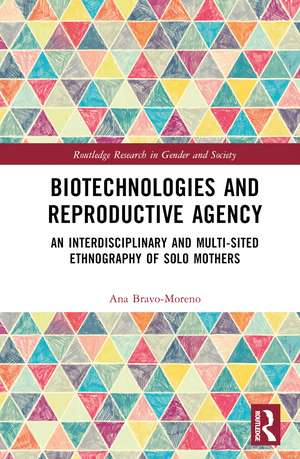Biotechnologies and Reproductive Agency: An Ethnography of Solo Motherhood in Spain and the United Kingdom: Routledge Research in Gender and Society
Autor Ana Bravo-Morenoen Limba Engleză Hardback – 14 oct 2024
Din seria Routledge Research in Gender and Society
- 5%
 Preț: 321.76 lei
Preț: 321.76 lei -
 Preț: 148.25 lei
Preț: 148.25 lei -
 Preț: 312.34 lei
Preț: 312.34 lei -
 Preț: 287.20 lei
Preț: 287.20 lei -
 Preț: 287.05 lei
Preț: 287.05 lei - 9%
 Preț: 1037.62 lei
Preț: 1037.62 lei - 23%
 Preț: 853.38 lei
Preț: 853.38 lei - 8%
 Preț: 389.01 lei
Preț: 389.01 lei -
 Preț: 361.84 lei
Preț: 361.84 lei -
 Preț: 311.41 lei
Preț: 311.41 lei -
 Preț: 304.94 lei
Preț: 304.94 lei -
 Preț: 310.22 lei
Preț: 310.22 lei -
 Preț: 310.45 lei
Preț: 310.45 lei -
 Preț: 307.00 lei
Preț: 307.00 lei -
 Preț: 310.41 lei
Preț: 310.41 lei -
 Preț: 385.21 lei
Preț: 385.21 lei -
 Preț: 278.93 lei
Preț: 278.93 lei - 5%
 Preț: 300.55 lei
Preț: 300.55 lei -
 Preț: 393.66 lei
Preț: 393.66 lei -
 Preț: 483.92 lei
Preț: 483.92 lei - 9%
 Preț: 1106.47 lei
Preț: 1106.47 lei - 28%
 Preț: 821.53 lei
Preț: 821.53 lei -
 Preț: 431.35 lei
Preț: 431.35 lei -
 Preț: 497.20 lei
Preț: 497.20 lei -
 Preț: 488.51 lei
Preț: 488.51 lei - 18%
 Preț: 1057.89 lei
Preț: 1057.89 lei -
 Preț: 355.13 lei
Preț: 355.13 lei - 18%
 Preț: 1001.39 lei
Preț: 1001.39 lei - 18%
 Preț: 1110.77 lei
Preț: 1110.77 lei - 18%
 Preț: 1117.07 lei
Preț: 1117.07 lei - 31%
 Preț: 766.85 lei
Preț: 766.85 lei - 18%
 Preț: 1060.87 lei
Preț: 1060.87 lei - 18%
 Preț: 1057.05 lei
Preț: 1057.05 lei - 18%
 Preț: 1121.81 lei
Preț: 1121.81 lei - 30%
 Preț: 850.91 lei
Preț: 850.91 lei - 18%
 Preț: 1111.16 lei
Preț: 1111.16 lei -
 Preț: 478.71 lei
Preț: 478.71 lei - 18%
 Preț: 1057.09 lei
Preț: 1057.09 lei - 9%
 Preț: 1040.39 lei
Preț: 1040.39 lei - 18%
 Preț: 1112.34 lei
Preț: 1112.34 lei - 15%
 Preț: 699.79 lei
Preț: 699.79 lei - 18%
 Preț: 1163.63 lei
Preț: 1163.63 lei - 18%
 Preț: 1116.02 lei
Preț: 1116.02 lei - 18%
 Preț: 1115.33 lei
Preț: 1115.33 lei
Preț: 1001.90 lei
Preț vechi: 1221.83 lei
-18% Nou
Puncte Express: 1503
Preț estimativ în valută:
191.74€ • 208.20$ • 161.06£
191.74€ • 208.20$ • 161.06£
Carte tipărită la comandă
Livrare economică 22 aprilie-06 mai
Preluare comenzi: 021 569.72.76
Specificații
ISBN-13: 9781032209821
ISBN-10: 1032209828
Pagini: 186
Ilustrații: 2
Dimensiuni: 156 x 234 mm
Greutate: 0.5 kg
Ediția:1
Editura: Taylor & Francis
Colecția Routledge
Seria Routledge Research in Gender and Society
Locul publicării:Oxford, United Kingdom
ISBN-10: 1032209828
Pagini: 186
Ilustrații: 2
Dimensiuni: 156 x 234 mm
Greutate: 0.5 kg
Ediția:1
Editura: Taylor & Francis
Colecția Routledge
Seria Routledge Research in Gender and Society
Locul publicării:Oxford, United Kingdom
Public țintă
PostgraduateCuprins
Preface: Aims of this book Introduction Chapter 1. Solo motherhood: ART, politics, religion and medical practice Chapter 2. Transcending blood, genes, and the biological nuclear family Chapter 3. Science, profits and success rates. What about patient care? Chapter 4. Reproductive agency and ART: the role of hospitals, legal frameworks, and the media Chapter 5. The intersection of reproductive, work-life balance, early-education and care policies. Chapter 6. Children’s Education. Does Feminism Matter? Chapter 7. Conclusions Appendix Index
Notă biografică
Ana Bravo-Moreno is the principal investigator of an ERC Advanced Grant at the National Research Council (CSIC) in Madrid, Spain, and a tenured professor in social anthropology. She has been a research fellow at the IoE-University College of London (UCL), and a principal researcher at the Institute of Migration Studies, Comillas University in Madrid, and at the University of Granada. Over the years, she has been granted funding for her research from the Marie S. Curie Actions (H2020), Next Generation, Programa Ramón y Cajal, Plan Nacional I+D and AECID among others. Her PhD was awarded by the Institute of Education (IoE), University of London, with funding from the Economic & Social Research Council, UK. Prior to that, she earned an MSc in social anthropology from UCL, participated as an Erasmus student in the MA in Women's Studies at the IoE, and holds a BA (Hons) in Philosophy from the Autonomous University in Madrid. She has been a visiting scholar at the University of California Irvine, UC-Berkeley, Brown University and Florida International University and has taught at the Open University and City University in London. Her research has focused on assisted reproductive technologies, new family forms, reproductive health, international migration and education.
Descriere
As artificial reproductive technologies become available to populations that have previously not had access to them, this book asks how reproduction is being transformed by technologies and individuals whose sexual and reproductive lives may defy sociocultural norms, religious codes and national laws.
